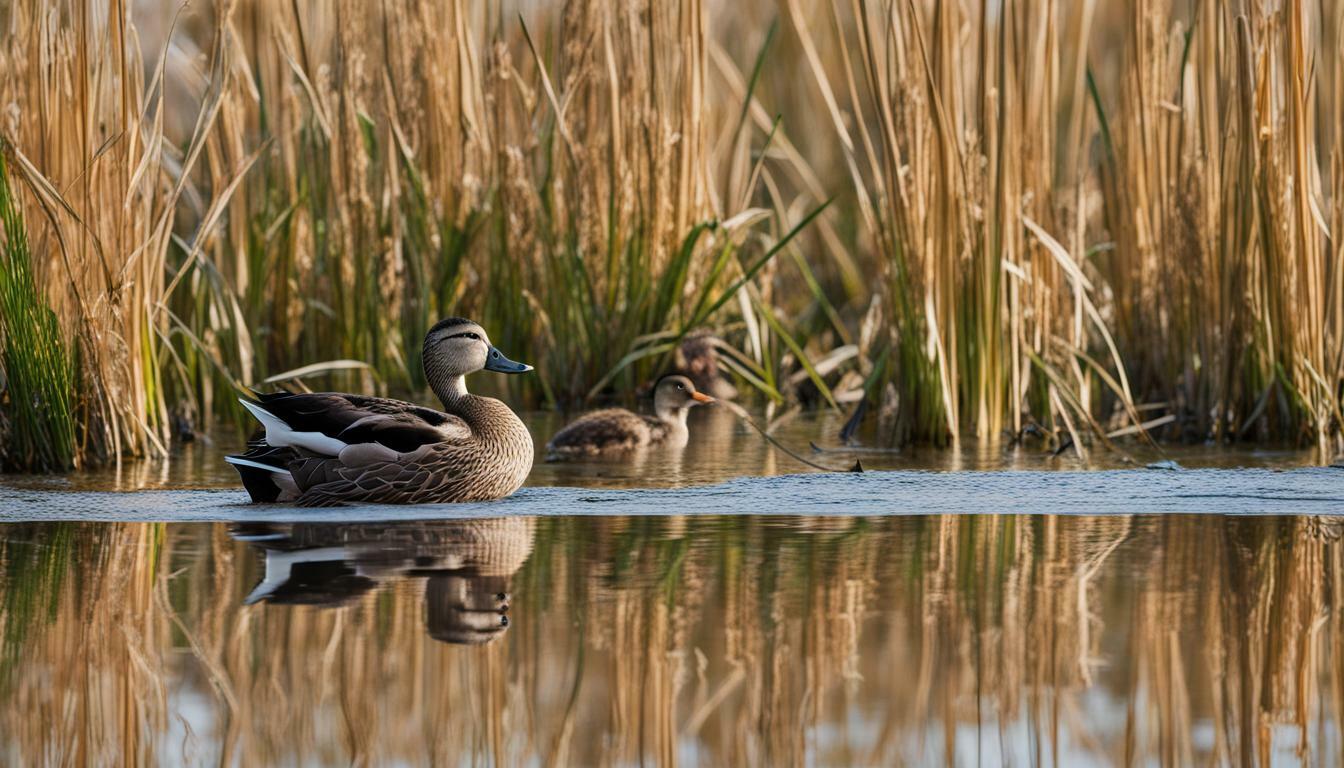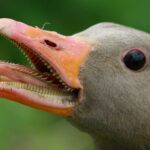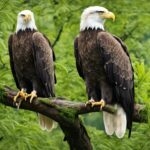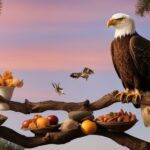As waterfowl species, ducks are found in a wide range of habitats worldwide, from freshwater ponds to saltwater estuaries. Understanding their dietary habits is crucial for conservation purposes and managing their populations. One question that often arises is whether ducks eat mice.
In this article, we will explore the natural diet of ducks, their feeding habits, and whether they consume mice. By the end of this read, you will gain a comprehensive understanding of duck feeding and the factors affecting their food choices.
Key Takeaways:
- Ducks are waterfowl species with a wide range of habitats.
- Understanding duck dietary habits is essential for conservation purposes.
- This article explores whether ducks eat mice, their feeding habits, and natural diets.
Duck Feeding Habits: Understanding Waterfowl Feeding Behavior
Ducks are omnivorous birds that feed on a variety of food sources. However, their feeding behavior is dependent on the species and their natural habitat. Understanding the feeding habits of ducks is crucial to their survival and conservation efforts.
Duck feeding habits are broadly classified as filter feeding, dabbling, and diving. Filter feeding is a feeding behavior where ducks skim the water surface, straining food particles using their beaks. Dabbling is the behavior of ducks submerging their head underwater, often hindquarters in the air, feeding on aquatic weeds and invertebrates. Diving is where ducks actively dive underwater to forage for their food. Different species of ducks prefer different feeding behaviors, which are influenced by the location and availability of food sources.
Ducks primarily feed on seeds, aquatic plants, insects, and small invertebrates. Their natural diet varies based on their geographical location and the availability of food sources. Some species of ducks are known to consume small fish and amphibians as well. Their food preferences are also influenced by seasonality, habitat, and competition for resources.
The Natural Diet of Ducks
Understanding the natural diet of ducks is crucial for their conservation. These waterfowl species feed on a diverse range of food sources, including plants, insects, and small animals. Their food preferences vary depending on factors such as season, habitat, and competition for resources.
Plants make up a significant portion of the diet of most duck species. They consume a variety of aquatic plants, such as pondweeds and coontails, as well as terrestrial plants, including grasses and sedges. Insects are also a common food source for ducks, particularly during the breeding season when protein is essential for the growth of their young.
However, ducks are also known to consume small animals, including mice. While not a major part of their diet, some species have been observed preying on mice, particularly in areas where their preferred food sources are scarce. For example, mallards have been documented consuming small rodents, including house mice and voles.
The natural availability of food sources plays a significant role in shaping the dietary preferences of ducks. For example, in areas where aquatic vegetation is abundant, ducks may consume more plant material. In contrast, in areas where insects and small animals are more readily available, they may consume more of those food sources.
Overall, understanding the natural diet of ducks is essential for their conservation and management. By studying their feeding habits and preferences, we can better understand the ecological roles of these waterfowl species and develop strategies to protect their habitats and food sources.
Duck Predation on Mice
When it comes to the question of whether ducks eat mice, the answer is yes. While ducks are primarily herbivorous, they are opportunistic feeders and will consume small animals like mice, especially when other food sources are scarce.
Studies and observations have documented instances of ducks preying on mice. For example, Mallards have been observed feeding on small mammals like mice and voles. Similarly, Wood Ducks have been known to consume small animals like insects, crustaceans, and even small fish.
While the extent to which ducks consume mice varies based on species, location, and other factors, there are several reasons why they may choose to include these small animals in their diet. For one, mice and other small animals can provide a source of protein and other nutrients that may not be as readily available in their typical plant-based diet. Additionally, consuming small animals can serve to supplement their diet during times of food scarcity.
Overall, while mice may not be a primary food source for ducks, their inclusion in the diet is not uncommon. As with many aspects of duck feeding behavior, the extent to which they consume mice is dependent on a variety of factors and varies between individuals and populations.
Mice as Duck Food: Frequency and Benefits
While ducks primarily feed on plants and insects, they are also known to consume small animals like mice. The frequency of mice consumption by ducks varies based on several factors, including species, location, and food availability.
Despite their small size, mice can provide valuable nutrients to ducks. They are an excellent source of protein and fat, which are necessary for the birds to maintain their energy levels during migration and breeding seasons.
It is important to note that not all ducks consume mice, and some species may have a greater affinity for them than others. For example, studies have shown that the diving duck species, such as the Common Goldeneye, tend to include more small animals in their diet than dabbling ducks like Mallards.
Overall, mice can be a beneficial addition to the natural diet of ducks, but their consumption is largely dependent on factors such as location and food availability.
Ducks and Small Animals: Other Predatory Behaviors
In addition to consuming mice, ducks have been observed preying on a variety of small animals. These can include fish, amphibians, insects, and other birds. Some species, such as the merganser, are known for their specialized predation on fish.
It is believed that small animals like mice are not a primary food source for ducks but rather a supplementary one. This means that while ducks may consume mice if they are available, they are not dependent on them for survival. However, the exact frequency of duck predation on mice varies depending on factors such as species, location, and seasonality.
The ecological significance of these interactions between ducks and other creatures in the wild is complex. While duck predation on small animals may be seen as a form of competition or threat by some, it also plays a role in maintaining the natural balance of ecosystems. Additionally, the nutritional value of consuming small animals could provide certain benefits to the ducks.
Factors Affecting Duck Food Choices
What do ducks eat? Their natural diet may vary depending on various factors such as season, habitat, and competition. Understanding these factors is crucial to comprehend the feeding preferences of these waterfowl species.
One of the critical factors affecting their food choices is seasonality. During the breeding season, ducks require high-calorie foods to meet their energy demands. Consequently, they feed on grains, nuts, and seeds. During the non-breeding season, ducks feed on insects, small animals, and aquatic plants.
Their habitat also plays a crucial role in determining their food choices. The natural diet of ducks in freshwater habitats mainly consists of aquatic plants, while those living in saltwater habitats feed on fish and crustaceans.
The availability of food sources is another significant factor affecting duck food choices. For instance, ducks may prefer to feed on certain plants or animals that are abundant in their environment, while others may be less appealing due to scarcity.
Finally, competition with other animals may also influence duck food choices, particularly in areas with limited food resources. Ducks may have to adapt their feeding habits, such as changing their diet or feeding behavior, to survive in such environments.
By considering the interplay between these factors, we can gain a better understanding of the natural diet of ducks. Such knowledge can help us develop conservation strategies to ensure that these vital waterfowl species can thrive in their habitats.
Conclusion
So, do ducks eat mice? The answer is yes, but it depends on various factors. While not all duck species consume mice, some have been observed preying on these small animals. However, mice make up only a small portion of their diet, as ducks primarily feed on plants, insects, and other aquatic creatures.
Understanding the natural diet of ducks is crucial for conservation efforts, as it helps us preserve their natural habitats and food sources. While mice may not be a significant part of their diet, they can provide important nutrients and benefits to the overall health of ducks when consumed as part of a varied diet.
Factors such as seasonality, availability of food sources, competition, and habitat also influence the dietary preferences of ducks. By recognizing and respecting these factors, we can ensure the survival of these important waterfowl species for generations to come.
What Other Animals Do Ducks Eat Aside from Tadpoles and Mice?
Unveiling duck dietary facts reveal that besides tadpoles and mice, ducks consume various other animals. They often feast on small fish, insects, snails, and even worms found in water bodies. This diverse diet ensures they get the necessary protein and nutrients to sustain their energy levels and maintain a healthy lifestyle.
FAQ
Q: Do ducks eat mice?
A: While ducks are primarily herbivores, some species have been known to consume small animals like mice, especially when other food sources are scarce.
Q: What are the general feeding habits of ducks?
A: Ducks exhibit various feeding behaviors, including filter feeding, dabbling (feeding on the surface or shallow water), and diving to search for food underwater.
Q: What are the natural food preferences of ducks?
A: Ducks prefer a diet consisting of plants, insects, small crustaceans, mollusks, and occasionally small animals like mice.
Q: Are there studies or evidence of ducks consuming mice?
A: Yes, there have been studies and observations documenting ducks predating on mice, indicating that they do consume them in certain circumstances.
Q: How frequently do ducks eat mice and what are the benefits?
A: The consumption of mice by ducks may vary depending on factors like location and food availability. Including small animals like mice in their diet can provide additional nutrients and contribute to their overall well-being.
Q: Do ducks exhibit predatory behaviors towards other small animals?
A: Ducks may also display predatory behaviors towards other small animals besides mice, such as insects, small fish, and amphibians.
Q: What factors influence duck food choices?
A: Duck food choices can be influenced by seasonality, habitat, food availability, and competition with other species. These factors help shape their dietary preferences.
Q: What is the conclusion regarding ducks eating mice?
A: While ducks are primarily herbivores, they have been observed consuming mice in certain situations. The variability in their diet is influenced by factors like species, location, and food availability. Understanding their natural diet is important for conservation efforts.










